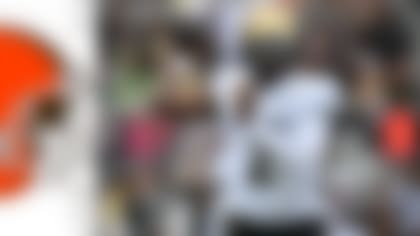The NFL has been drafting college players since 1936. Nothing has changed over the years, except almost everything. Yet, there is one certainty: General managers are staring down some tough draft decisions, with no sure answers revealed until the dominoes start falling on April 25 in Nashville, Tennessee.
There isn't a GM in the league who isn't confronted with pressing issues, conundrums and, ultimately, organizational questions in the weeks, then days, then hours leading up to the opening of the great college marketplace. It's during those three days of the draft, with the first one (Round 1) playing a disproportionately large role, when the guys running a team could decide its fate, and their own, for the next 10 years.
This is not to suggest that each question carries the same weight for every club. With 32 teams, there are a variety of challenges.
Do the Redskins move up to draft a quarterback or trade for someone else's or neither? Are the Colts going to go for it all this year by drafting for need or will they hug their draft board in hopes of replicating last year's bonanza?
Different teams, different questions. The endeavor to sort through all 32 squads was ambitious, and 6,000 words later, I don't have all the answers. You'll have to wait until after the picks start rolling in for those, just like the GMs.
So take a gander below and see which choices each NFC team must parse out in the next few weeks. Send your take while you're at it: @HarrisonNFL is the place.
To see every pick each team holds in the 2019 NFL Draft, click here.
Arizona Cardinals: How far are they willing to go to replace Josh Rosen?
Is drafting Kyler Murray the answer? Remember, there were plenty of folks who thought the former Oklahoma star played his way into the first round in December. In other words, he wasn't even valued that high up to that point. This whole idea of the uniquely gifted but not prototypical quarterback becoming the first overall selection seems to be as much hype as it is merited. Only the scouts, and guys like my colleagues Daniel Jeremiah and Bucky Brooks, are the right people to answer that question. The query posed here is whether Arizona should even consider Murray for the first pick. How about trading down and acquiring a gaggle of picks to build? Or choose Ohio State defensive end Nick Bosa, who might be the top player in this draft. If the Cardinals are going to take a chance on a QB1 in Round 1, they must get it right, especially since it's only been a year since they took a quarterback 10th overall. This is not meant to knock Murray. Maybe he is that right player, right time guy. So was Rosen a year ago, supposedly.
Atlanta Falcons: Will they eschew many of the mock drafts and rebuild Dan Quinn's defense?
The Falcons must support the defensive side of the ball in the draft, especially with the team needing another edge defender. Mock drafts galore predict Atlanta tabbing a replacement at right tackle with the 14th overall pick. That's cool. Draft predictions aside, can this team really afford to overlook corner in the first two rounds? Robert Alford is gone. So is Brian Poole. With Drew Brees coming off arguably the best season of his career, Cam Newton presumably in better throwing shape than a year ago post-surgery, and Bruce Arians certain to upgrade Jameis Winston's game, the need for talent on the outer realm of Dan Quinn's defense is real. The good news here is that there is plenty of talent available at edge rusher in this draft. There's not as much depth at offensive tackle, although GM Thomas Dimitroff and Co. could opt to grab a tackle early, then swing around at 45th or 79th overall to fortify the secondary. However they choose to bolster the group, this cannot be one of those "next year" items.
Carolina Panthers: Bypass pressing defensive needs early to protect Cam Newton?
Like the division-rival Falcons, the Panthers require assistance with the pass rush and in the secondary. And like Atlanta, they want to do whatever it takes to catch the Saints, which means stopping that swimmingly virile offense. Yet, how much longer can this organization afford to watch Cam Newton get rocked? Some of this falls on the quarterback himself, who is weary of altering his style of play. Thus, for draft purposes, Carolina should consider drafting a tackle at No. 16, which should be about the right spot to locate an instant starter. The Panthers should also pick up a thumper at running back who can make hay inside the 10, so that it's not the franchise QB taking all those hits. They swung and missed on C.J. Anderson last year, although he looked like Jerome Bettis for the Rams late in the year. Not to mention, Christian McCaffrey is a different brand of RB1. Look no further than what New Orleans did in free agency, adding Latavius Murray immediately once Mark Ingram left, so that the load is not all on Alvin Kamara. Slick.
Chicago Bears: Who's the kicker? Just kidding.
But seriously, how do the Bears knock the draft out of the park with no picks in the first two rounds? One possibility -- and a position where a team can find immense value in the third or fourth round -- is at running back. There was rampant speculation going back to last season that Chicago was looking to move on from Jordan Howard. Well, it wasn't so speculative, was it? The Bears were even reportedly kicking the tires on Adrian Peterson, and his tires are close to having no tread. In order to get the dual-threat, passing game-ready running back head coach Matt Nagy craves, perhaps Chicago should use its third-round pick to find that guy, a player that Howard never was. Whether Nagy will use him enough in a key playoff game is another matter (hypothetically speaking, of course). The Bears did sign Mike Davis before trading Howard, and they still have Tarik Cohen. Are they done at running back?
Dallas Cowboys: What is the plan for the defensive line?
The Cowboys' main priority, one would think, would be replacing the pass-rush production of the retired David Irving and indefinitely suspended Randy Gregory. There were fears they might need to replace DeMarcus "Tank" Lawrence, too, after he received the franchise tag for the second straight year, but he and the team agreed to a five-year, $105 million deal (with $65 million in guarantees) on Friday. While neither Gregory nor Irving was available enough to post large sack numbers last season, both were key parts of a rotation that kept the D-line fresh and effective. Dallas did acquire Robert Quinn recently, but he isn't the same player he used to be, and hasn't had a double-digit-sack season since 2014. With Taco Charlton looking like a bust through two seasons, there's still a need off the edge. Although, the answer might lie in getting a superior player inside, which Dallas hasn't had since Jay Ratliff's or La'Roi Glover's heyday, and would apply a different kind of pressure. Randall Cobb's signing only minimizes the potential for offense to be the focus of this draft.
Detroit Lions: After a defensive-minded free agency, do they use their high picks on the other side of the ball?
Detroit holds the eighth (Round 1), 43rd (Round 2), and 88th (Round 3) overall picks in the first three rounds. Tim Twentyman over at the Lions' team website says tight end would fill the biggest need. Eighth overall would be pretty rich for that position, which is apparently deep in this draft. Of course, no one knows whether that is true for about three years. What can be said now is that GM Bob Quinn should strongly consider using two of his first three picks on defense. A corner has to be part of that mix, either coupled with a pass rusher or another area where the Lions are thin, linebacker. Even with the addition of Trey Flowers, there is much work to be done on the non-Stafford side of the ball.
Green Bay Packers: Time to pick a potential QB1 of the future?
The Packers aren't as bad off as some pundits would have you think. They could use offensive line help. Wide receiver and tight end might be focuses in the draft, as well. Yet, at some point, Green Bay must weigh finding Aaron Rodgers' eventual replacement. He is 35 years old, Brett Favre's age when the Packers selected Rodgers. The latter wasn't exactly received with loving arms by Favre early on -- the veteran was not trying to push Rodgers' development with daily mentoring. A competitor like Rodgers would probably react in much the same way to the team selecting a quarterback this year. But with Rodgers getting hurt the last two years, and the team missing the playoffs both seasons, this need will only become more pressing. Tom Brady and Drew Brees have defied age at the position, but they haven't been beaten up like Rodgers over the years, either.
Los Angeles Rams: Is O-line help the ticket to getting back to the Super Bowl?
The Rams are loaded from top to bottom (again) after bolstering the majority of their weaknesses in free agency. The loss of guard Rodger Saffold (signed with the Titans), though, was significant. He was one of the keys to L.A. being able to run the football at will with Todd Gurley and C.J. Anderson, which, in turn, allowed Sean McVay to call about 188,296 play-action passes. Guard is not typically a sexy first-round pick -- thus, even though the Rams are picking 31st overall, they could find one of the top players at the position waiting for them. Center remains an option, as well, with the team having parted ways with John Sullivan. Fortifying the interior line doesn't kick-start much buzz about your football team. However, this group needs no such jumper cables. With a couple replacement parts, the Rams will charge right back into the mix come January.
Minnesota Vikings: Can they afford to not spend two picks, including their first selection, on the offensive line?
Despite finishing last season with a thud, the Vikings are ready to win now. The pieces are in place. Should Minnesota draft a DT early, that's fine. But as much as GM Rick Spielman and company might desire to go best player available with their picks, quality play up front on offense is what's keeping them from the promised land. Running the football was an intermittent fancy for this group last year, and leaning on Kirk Cousins to chuck it 40 times per game isn't the answer. Finding a road-grading guard or tackle can be tricky with the way the college game has evolved, yet that's the Vikes' quickest path to their fifth Super Bowl appearance. The acquisition of Josh Kline tightens the screws, but the O-line still should be the focus for this serious contender.
New Orleans Saints: Is bulking up Drew Brees' arsenal a priority?
As good as this group is, the Saints still have a few needs. They filled a massive void by bringing center Nick Easton in house in the wake of Max Unger's retirement. Defensive end is an area the team is sure to address at some point. GM Mickey Loomis and head coach Sean Payton must at least be contemplating what to add to Drew Brees' arsenal. The Saints are ready to win their second Lombardi Trophy now. Brees might have two years left playing at his current level. Thus, tight end was an obvious spot to upgrade, but then Loomis signed Jared Cook. That still leaves receiver as a need. What if a legit WR prospect is still hanging there when the Saints make their first pick (62nd overall)? It seems doubtful, but multiple so-called surefire first-rounders plummet in the draft each year. After that, the team's next pick won't come until the fifth round (No. 168). If no gifted WR represents an immense value at the end of the second round, the prediction here is that Loomis grabs an edge defender or another corner. Then again, who knows?
New York Giants: Who will be the outside threat at receiver?
It seems obvious that the Giants will be thinking quarterback at some point early in the draft, and if fans had it their way, it would be addressed sooner rather than later. But whom will that rookie QB, or Eli Manning, be throwing to? With Golden Tate now in the mix, joining Sterling Shepard and Evan Engram, the Giants have wonderful inside targets. What New York doesn't employ is a bona fide "X" receiver. Who is the WR1 on the perimeter? If the Giants go QB, OL or attempt to fortify the defense further in the draft, the passing "attack" might resemble a variety pack of 5-yard slants and TE seam routes -- not enough to push the ball down the field. They will have plenty of opportunities to find an upgrade over Cody Latimer and Corey Coleman with 12 total selections. Just, uh, throwing that out there, so to speak.
Philadelphia Eagles: Major needs on defense, but are they done at running back?
You would think the Eagles will sit tight at running back after trading for Jordan Howard. The team played a whole host of different guys at the position last year with middling results, be it Jay Ajayi, Corey Clement, Josh Adams or Wendell Smallwood. Although the Eagles are sure to throw the ball plenty, especially with the re-acquisition of DeSean Jackson, they require more consistent balance this year to help Carson Wentz be successful. The secondary will surely be a focus, likely early in the draft. Once those needs are addressed, what's left? The front seven. The Eagles don't have enough sturdy parts to build a championship-level rotation up front. They will be duct-taping their depth unless they address this area early in the draft. The losses of Michael Bennett and Timmy Jernigan were far from catastrophic, but both were catalysts in keeping the defensive front rested as Philadelphia made its playoff push late in the season and in the first two rounds of the playoffs. The secondary isn't nearly stout enough to mitigate middling pressure from the defensive line. The beauty here is that this is the perfect draft to be in need of defensive linemen, given the depth at the position.
San Francisco 49ers: Are they strong enough to ignore needs, draft the best player available and still make the playoffs?
The 49ers are starting to put the pieces in place for a postseason run. Does GM John Lynch think they have enough to draft the top player on their board with nary a nod to team need? An area San Francisco should address early is wide receiver. Jordan Matthews is fine as a WR3. Marquise Goodwin is a solid starter. Yet, tight end George Kittle resides as far and away the Niners' scariest passing-game threat. With RBs Jerick McKinnon and Tevin Coleman expected to participate heavily in the air game, San Francisco doesn't have to use its second overall pick to add a pass catcher. The Niners, like every other franchise, are cognizant that picking that high supersedes merely filling a hole, unless they intersect in that stratosphere. Guessing that Lynch will want edge rusher Nick Bosa with his top pick. Another area of major interest: cornerback.
Seattle Seahawks: Does WR rise to the top of the to-do list?
Check out any mock draft for the Seahawks, and you are sure to find edge rusher or defensive tackle as their projected first-round selection. That's OK. They could use help in those spots, but they might also go another route to address the D-line need. Seattle could give free agent Ndamukong Suh a look, for example. Thankfully, defensive line talent will still be around after the first round in this draft class. Not discussed as much for Seattle: wide receiver. As it stands today, the Seahawks don't have a healthy Doug Baldwin. Tyler Lockett is dynamic, but is not an ideal red-zone target at 5-10, 182. David Moore has flashed at times. It's a solid receiver corps with no Pro Bowl-level player. Seattle has won, and won big, sans a big-time WR1 in the past. That was with the top defense in the league, which they don't own anymore. As effective as they are running the football, Russell Wilson can't scurry around like he has forever. Frankly, the Seahawks could've afforded to open the offense up more, way more, during their playoff loss in Dallas. I like the idea of GM John Schneider bulking up the defensive front, but I wonder what will happen if the top WR on the board is sitting there for him with the 21st overall pick. Remember that D.J. Moore, drafted first among the WRs last year, went later than that (24th).
Tampa Bay Buccaneers: How do they jump-start the running game?
The Bucs are in the early stages of a process that will, in theory, propel them past being perennially in last or next-to-last place. After finishing in the basement again in 2018, the organization has found itself in the bottom half of the division 10 of the last 11 seasons. Obviously, GM Jason Licht and the personnel staff must acquire as much talent as possible. That's not exactly investigative reporting at its zenith. But wouldn't it be prudent to prioritize the ground game? Tampa hasn't produced a consistent, quality rushing attack year over year in decades. Only twice in the last 18 seasons have the Bucs finished in the top 10 in rushing. I'm aware that they re-signed their leading rusher from last season, Peyton Barber, to a one-year deal and drafted Ronald Jones in the second round last year, but they got virtually zero return on investment from Jones in 2018. This whole notion is more than just about finding an RB1, too. Drafting an offensive tackle who can move people out of the way, and seal the edge, would be optimal. While Bruce Arians loves to work with quarterbacks, you'll find with your own investigative research that his Cardinals teams used David Johnson extensively, including in the passing game.
Washington Redskins: Move up in the draft and get a quarterback?
Case Keenum should be a rental, in theory. Yet, if he is merely a bridge to getting Alex Smith back from injury, as some have speculated, then Washington would not use its draft capital this year to get a Drew Lock, whom Washington recently hosted on a pre-draft visit, or one of the other top QB prospects. The problem with this strategy is that, at this point, we don't know when or if Smith will play again. Worth noting that he's 35 years old, which isn't past the point of staying effective, but old enough for the organization to be seeking a replacement anyway. Perhaps Washington will spend a Day 2 pick (Rounds 2-3) on the position, while seeing if Keenum is more his 2017 self than the 2018 version. That's a 20-sided die roll if you ask me. (The 20-sided die was a nod to all you D&D players of the 1980s.) If they don't go all in on a QB, then WR, CB and offensive line are strong possibilities. The O-line has been such an issue, due to about a billion injuries (give or take) over the last two years.
Follow Elliot Harrison on Twitter @HarrisonNFL.












